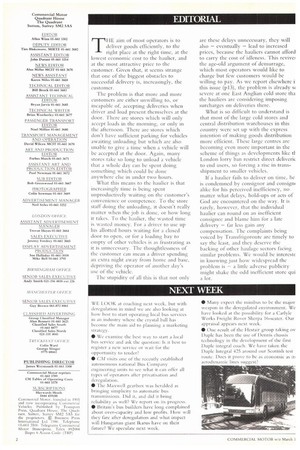EDITORIAL
Page 2

If you've noticed an error in this article please click here to report it so we can fix it.
THE aim of most operators is to deliver goods efficiently, to the right place at the right time, at the lowest economic cost to the haulier, and at the most attractive price to the customer. Given that, it seems strange that one of the biggest obstacles to successful delivery is, increasingly, the custonler, The problem is that more and more customers are either unwilling to, or incapable of, accepting deliveries when driver and load present themselves at the door. There are stores which will only accept loads in the morning, or only in the afternoon. There are stores which don't have sufficient parking for vehicles awaiting unloading but which are also unable to give a time when a vehicle will be accepted at the door, Again, many stores rake so long to unload a vehicle that a whole day can be spent doing something which could be done anywhere else in under two hours. .
What this means to the haulier is that increasingly time is being spent unproductively waiting on the customer's convenience or competence. To the store staff doing the unloading, it doesn't really matter when the job is done, or how long it takes. To the haulier, the wasted time is wasted money. For a driver to use up his allotted hours waiting for a closed door to open, or for a loading bay to empty of other vehicles is as frustrating as It is unnecessary. The thoughtlessness of the customer can mean a driver spending an extra night away from home and base, depriving the operator of another day's use of the vehicle.
The stupidity of all this is that not .only are these delays unnecessary, they will also — eventually — lead to increased prices, because the hauliers cannot afford to carry the cost of idleness. This revive the age-old argument of demurrage, which most operators would like to charge but few customers would be willing to pay. As we report elsewhere this issue (p13), the problem is already s( severe at one East Anglian cold store tha the hauliers arc considering imposing surcharges on deliveries there.
What is so difficult to understand is that most of the large cold stores and central distribution warehouses in this country were set up with the express intention of making goods distribution more efficient. These large centres are becoming even more important in the scheme of things as developments like ti London lorry ban restrict direct deliveric to end users, so forcing a rise in transshipment to smaller vehicles.
If a haulier fails to deliver on time, he is condemned by consignor and consigm alike for his perceived inefficiency, no matter what delays, hold-ups or acts of God arc encountered on the way. It is rarely, however, that the individual haulier can round on an inefficient consignee and blame him for a late delivery — far less gain any compensation. The complaints being voiced by Transfrigoroutc are timely to say the least, and they deserve the backing of other haulage sectors facing similar problems. We would be interestc in knowing just how widespread the problem is — a little adverse publicity might shake the odd inefficient store qui a lot.




























































